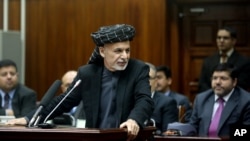Eight ministers along with the head of Afghanistan’s intelligence agency started work Monday, four months after Afghanistan completed its divisive electoral process and President Ashraf Ghani formed a unity government with Chief Executive Abdullah Abdullah.
The nine men, who will lead some of the key positions in Afghanistan, include the foreign, interior, and finance ministers. The defense minister nominee and nine others of the 19 candidates were rejected by the Afghan parliament last week.
The government has faced harsh criticism for taking such a long time in forming a Cabinet during a year considered crucial for the future of the country. Kate Clark of Kabul-based Afghanistan Analysts Network blames the delay on an internal power struggle among Afghanistan’s elite, who wanted either themselves or their people in the Cabinet. President Ghani had insisted the ministers were to have the right background for the job.
“In the end we got something that was a bit of mish mash of everything,” said Clark.
The new Cabinet will be governing the country at a time of transition that analysts say could either see it emerge as a democratic state or be reduced to a state of civil war of the kind seen in 1990s, after the withdrawal of former Soviet Union. NATO and ISAF forces are gearing up to reduce their footprint and limit their role in the country to support and training. The efforts at making a peace deal with the Taliban have been unsuccessful.
One of the most challenging positions at such a time will be of the head of National Directorate of Security, Afghanistan’s domestic intelligence agency. Rahmatullah Nabil, the new head, is an old hand in this position. A former U.N. official, he became the head of the agency in 2010 after he proved his metal running the force that protected former President Hamid Karzai. He was sidelined briefly in 2012 in favor of a political ally who was severely wounded in a suicide attack a few months into his tenure. Nabil was brought back as acting head of the agency by then President Hamid Karzai and again nominated to the post by President Ghani.
Unlike his predecessors, who were extremely controversial, Nabil is reputed to be honest and hard working. His biggest challenge will be to tackle two things at once says Ahmed Rashid, author of several books on Afghanistan and the region. On one hand he has to dismantle the urban cells the Taliban have formed in all major cities, on the other he has to explore the possibility of talks with the Taliban.
Facilitating these talks will also be the primary challenge for new Foreign Minister Salahuddin Rabbani. He is the head of powerful Jamiat e Islami Afghanistan - one of seven Peshawar based parties that fought the former Soviet Union. He is also the head of the High Peace Council, a position he accepted after the former head, his father Burhanuddin Rabbani, was killed in a suicide bomb attack. He was nominated by Chief Executive Abdullah whom he supported during the Afghan elections. His reputation as the head of the Council will help him push the agenda of peace with the Taliban, but he will need Pakistan’s help.
Rashid says President Ghani has been very “obliging” during the past couple of months in terms of taking action against the Pakistani Taliban in Afghanistan and it is time for Pakistan to return the favor.
Restoring peace in Afghanistan will also be the responsibility of Nur ul-Haq Ulumi, the new interior minister and one of the few generals of the former communist regime toppled by the Afghan mujahideen in 1992. A Pashtun from Kandahar, he was the governor-general of the state under President Mohammad Najibullah Ahmadzai. He will be in charge of the Afghan police.
Afghanistan’s security challenges have also complicated its economic woes. Rashid fears a “catastrophic crisis” is brewing. The economy is expected to take a further hit as NATO and ISAF forces withdraw this year and the international NGOs scale back their operations due to security concerns. Afghanistan already spends more than it collects in revenue and has to rely on international support to keep its operations running.
The responsibility of dealing with this daunting task has fallen on the shoulders of Eklil Hakimi, the new minister of finance. He has been Afghanistan’s ambassador to the United States, Japan, and China. He was a Ghani nominee after the first choice for this post, Ghulam Jilani Popal, had to drop out of the race due to the parliament’s concerns about his possible dual Afghan and U.S. citizenship.
The other elected members of the Cabinet include Sayed Hussain Alemi Balkhi as minister for refugees, Firuzuddin Firuz as minister for public health, Nasir Durrani as minister for rural development, Daud Shah Saba as minister for mines, and Faiz Muhammad Usmani as minister for Haj and religious endowments.
The parliament is taking a 45 day winter break after the first round of Cabinet elections, but the unity government has indicated it may call lawmakers back early if the nominees for the rest of Cabinet posts are finalized.
Rashid says the pace of Cabinet formation is “depressing” for Afghans who want to see their country “get on with the business of governance.”




